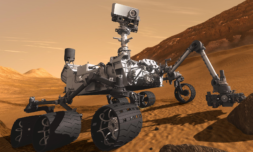The secretive space mission is called Tianwen-1 and is scheduled to land on Mars in seven months time.
China has officially entered the Mars space race with the successful launch of Tianwen-1, an unmanned rover that will land sometime in February if all goes well.
It would make China the second country to land and operate a rover on Mars after the US. The Tianwen-1 consists of an orbiter, lander, and rover, and was launched at China’s Wenchang Spacecraft Launch Site on 23rd July. The plan is to orbit around Mars and land on Utopia Planitia, where there might be evidence of underground ice. From there, the rover will study the planet’s geology and learn about what could be underneath the surface.
It’s one of three rockets being launched over the next few weeks. The Hope probe developed by the United Arab Emirates successfully took off on 20th July but will only be orbiting Mars, and the US will be launching a new rover called Perseverance in Florida on 30th July. Nations are eager to get their rovers and probes on course for Mars while it orbits close to Earth, making this an ideal time to blast off into the stars.




















